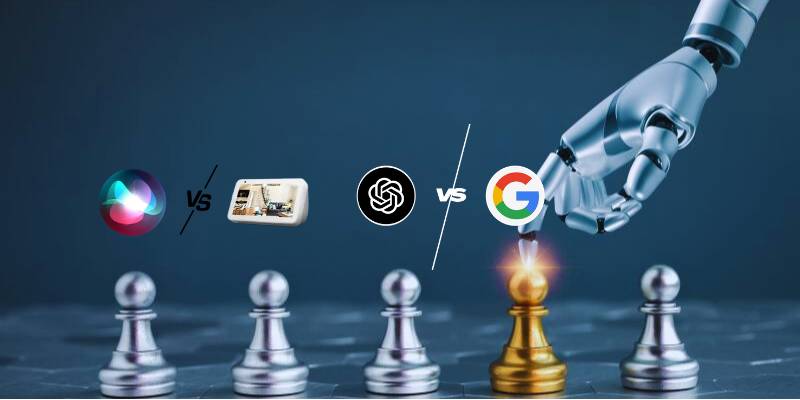It’s a funny thing: a decade ago, if someone said, “I asked my assistant to turn off the lights,” you’d picture a human being walking over to a switch. Now? You assume they mean Alexa, Siri, or Google. And lately, maybe even ChatGPT.
That shift in language tells us everything about how deeply AI assistants have crept into our lives. They’ve moved from novelties to everyday companions.
We wake them up with a “Hey Siri” or “Okay Google,” and sometimes without meaning to, we find ourselves depending on them more than expected.
But here’s the bigger question: which of these assistants—Alexa, Siri, Google Assistant, or ChatGPT—is winning? And maybe more importantly, should we even want one “winner”?
This isn’t just a head-to-head comparison. It’s an exploration of where each excels, where they fall short, and what their existence says about us.
Consider this an opinionated map of the AI assistant battlefield, complete with frustrations, stats, and a few moments of banter about the quirks we’ve all noticed.
Chapter 1: Alexa—The Household Name
If any assistant can claim credit for making voice AI mainstream, it’s Alexa. Amazon’s smart speaker rollout in 2014 was, frankly, brilliant. Suddenly, you had this unassuming device sitting in your living room, ready to play music, order paper towels, or answer trivia questions.
Amazon now has over 500 million Alexa-enabled devices worldwide (Business Insider, 2023). That’s no small feat.
But here’s my gripe: Alexa is both everywhere and nowhere. It’s fantastic at turning on lights or adding milk to your shopping list, but when you try to have a more nuanced conversation—say, ask about the history of jazz—it stumbles.
It often feels more like a well-trained parrot than a genuine conversational partner.
Still, for smart home dominance, Alexa remains unmatched. If your life revolves around controlling devices, Alexa is the clear winner.
Chapter 2: Siri—The Pioneer With Limits
Siri had the first-mover advantage, launching in 2011 with the iPhone 4S. Back then, it felt like something out of science fiction. You could ask your phone a question instead of typing, and it actually answered.
Fast forward to now, and Siri feels… dated. It works seamlessly for iOS users—setting reminders, sending texts, pulling up directions—but compared to Google Assistant or ChatGPT, it often feels shallow.
I’ve lost count of how many times I’ve asked Siri something only to get, “Here’s what I found on the web.”
That said, I’ll give Siri this: it’s consistent. And because it’s embedded into Apple’s tightly controlled ecosystem, it benefits from Apple’s stronger emphasis on privacy. Many people trust Siri more because Apple markets it as processing requests locally whenever possible.
But innovation-wise? Siri is lagging. It’s less a groundbreaking assistant now and more a steady, reliable tool in the background.
Chapter 3: Google Assistant—The Knowledge Powerhouse
If you care about accuracy and information, Google Assistant is hard to beat. It taps directly into Google Search, meaning its answers are often more reliable and data-rich than Alexa or Siri.
I’ve used Google Assistant for things like:
- Translating phrases while traveling.
- Finding obscure facts on the fly.
- Navigating complex calendar scheduling.
And it delivers with surprising fluidity. It’s also deeply integrated with Android devices and Google’s ecosystem, which makes it a natural fit if you’re already a Google user.
But—and this is a big but—privacy concerns are louder here. Google thrives on data, and every interaction feeds into its ecosystem. For some, that’s the price of convenience. For others, it’s a dealbreaker.
Still, in the category of being useful, Google Assistant often feels like the adult in the room compared to Siri and Alexa.
Chapter 4: ChatGPT—The Conversational Wildcard
Then there’s ChatGPT, the newcomer that flipped the table. Unlike Alexa, Siri, or Google Assistant, it wasn’t designed as a voice-first tool.
It emerged as a text-based conversational model, but quickly proved it could do things the others couldn’t—like draft essays, write code, or roleplay as a mentor.
What makes ChatGPT different is its adaptability. Instead of short, transactional answers, it can sustain context, offer nuanced insights, and even reflect empathy in ways the others can’t.
But it has limits too. It doesn’t naturally control smart homes or integrate seamlessly into operating systems (at least not yet). And while it feels more “human” in conversation, it sometimes hallucinates facts, which can erode trust.
Still, if the future of AI assistants is about depth of interaction rather than turning on the kitchen lights, ChatGPT has already shifted the playing field.
Chapter 5: Explained: The Rise of Voice-First AI Assistants
If you zoom out, the real story here is explained: The Rise of Voice-First AI Assistants. Voice has always been humanity’s most natural interface. We talked long before we wrote. And these assistants are tapping into that instinct.
- By 2023, more than 150 million smart speakers were active in U.S. households (Statista).
- Over 60% of Americans now use voice assistants on their smartphones.
That’s not a passing trend—that’s infrastructure. The ability to simply say what you want and have it done changes behavior. It lowers barriers.
And whether it’s Alexa dimming your lights or Google giving you a recipe, it creates a feeling of seamlessness we didn’t know we craved until it arrived.
ChatGPT, interestingly, is now dipping into this space with voice options, suggesting that the battle will soon include a full collision of voice-first and text-first models.
Chapter 6: The Truth About How AI Assistants Are Changing Customer Service Forever
Here’s another arena where the battlefield plays out: customer service.
The truth about How AI Assistants Are Changing Customer Service Forever is simple: they’ve already reshaped it. A 2022 IBM report found that companies using AI assistants cut call center costs by 30% while improving response times.
Think about it: instead of waiting on hold, you get an instant chatbot that resolves your billing issue in minutes. Convenient, yes. But also dehumanizing, sometimes. Because when the bot can’t solve your problem, the frustration is palpable.
Here’s my opinion: assistants like ChatGPT could radically improve this space by making customer service more conversational, less scripted. But the risk of companies prioritizing cost savings over empathy is high. That tension—efficiency versus humanity—isn’t going away.
Chapter 7: The Truth About Do AI Assistants Make Us Lazy Thinkers or Smarter Humans?
This debate fascinates me: the truth about Do AI Assistants Make Us Lazy Thinkers or Smarter Humans?
On one hand, outsourcing memory and problem-solving to machines risks cognitive laziness. I’ve noticed myself relying on reminders so much that I forget birthdays I used to remember instinctively.
On the other hand, freeing up mental bandwidth can make us smarter in more meaningful ways. If I don’t have to spend energy juggling trivial details, I can invest that energy in creative work, relationships, or strategy.
So, which is it? Lazy thinkers or smarter humans? Honestly, both. It depends on how we use the tools. The danger isn’t the assistants themselves—it’s forgetting to use our own minds alongside them.
Chapter 8: Hot Take on AI Companions vs. AI Assistants
And now for a curveball: the hot take on AI Companions vs. AI Assistants.
There’s a growing distinction here. AI assistants are functional—they schedule, search, control. AI companions, on the other hand, are designed for emotional connection. Think of apps like Replika, or even ChatGPT when people start treating it like a friend.
Is that healthy? It depends. On one hand, companionship AI can fill real emotional gaps, offering comfort to people who might otherwise feel isolated. On the other hand, it risks blurring lines between authentic human connection and simulated empathy.
Personally, I think assistants should remain assistants. Companions can be useful, but they shouldn’t replace the messy, unpredictable beauty of human relationships.
Still, the line is already blurry, and as AI gets more lifelike, the tension between utility and companionship will only grow.
Chapter 9: Privacy and Trust—The Elephant in the Room
We can’t talk about AI assistants without tackling privacy. Are they always listening? Technically, no. But practically, they capture and process far more data than most of us realize.
A Pew Research survey found that 72% of Americans worry about how companies use the data collected by AI assistants. That’s not paranoia—that’s rational concern.
Trust is the differentiator here. Apple leans on its privacy branding. Google asks for trust in exchange for personalization. Amazon downplays concerns in favor of convenience. OpenAI, with ChatGPT, is still carving out its stance.
In my view, the assistant that figures out how to combine usefulness with genuine transparency will win more hearts than the one that just wins market share.
Chapter 10: Where Does the Battle Go Next?
So, who’s winning the battle today?
- Alexa dominates smart homes.
- Siri quietly rules Apple’s walled garden.
- Google Assistant is the knowledge champ.
- ChatGPT is the conversational disruptor.
But the battle isn’t static. Voice-first tools are merging with conversational AI. Privacy concerns are shaping consumer trust. And the line between assistant and companion is blurring.
The future won’t belong to a single winner—it will belong to the assistant that adapts fastest to what we, as humans, actually need. And maybe what we need isn’t just speed or facts, but a sense of being understood.
Conclusion
The battle of AI assistants isn’t just about tech giants duking it out. It’s about us—how we work, how we think, and what we value in our interactions with machines.
Do we want assistants that are purely efficient? Or ones that feel more human? Do we want privacy at all costs, or convenience that comes with trade-offs?
Personally, I think the most successful assistant will be the one that learns to walk the fine line between utility and empathy. Because at the end of the day, we don’t just want answers. We want to feel heard—even if it’s by a machine.


